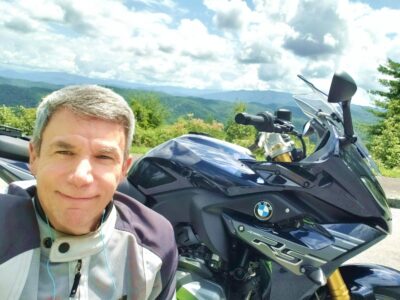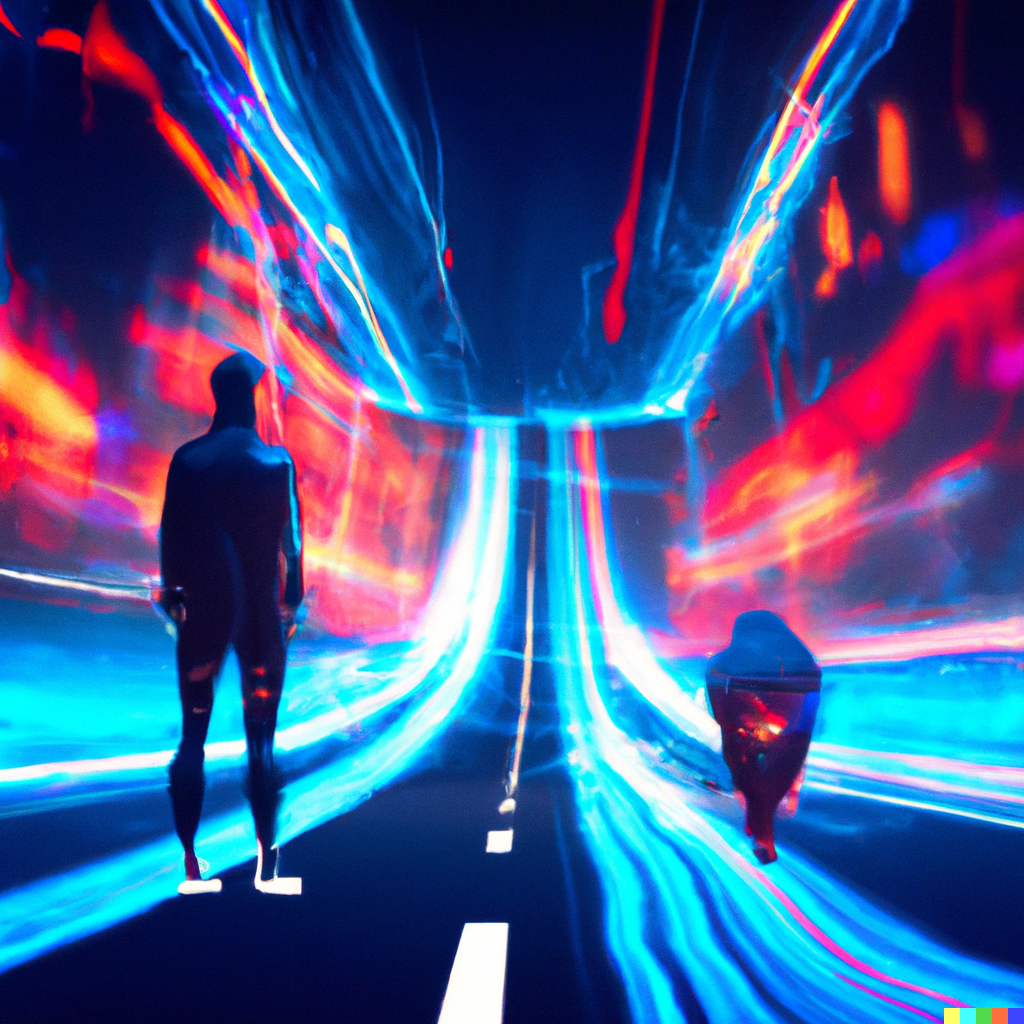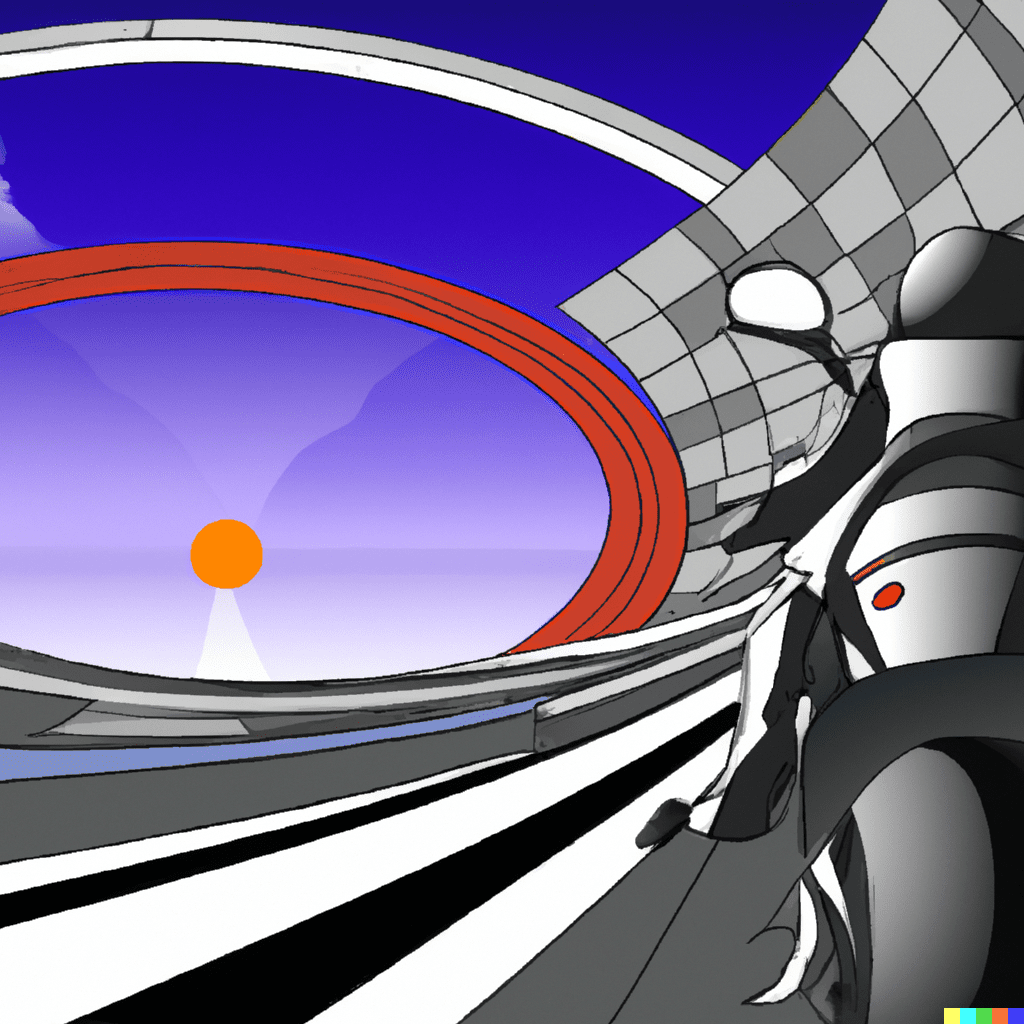 Sci-fi depictions of time travel always show people going back to the past or ahead to the future. Ironically, that’s what many human beings spend most of their lives doing without the use of any special technology. We spend much of our mental energy rummaging around in the realm of memory, fretting about choices we wished we’d made differently, longing nostalgically for the golden days of our youth, or chaffing at injustices or bad luck we’ve had to endure over the years. Or we set our sights on goals we have yet to achieve (quickly replaced by the next batch upon completion), horrors and losses we fear may await on our horizon, or rewards that dangle like carrots from a stick attached to our heads, forever imminent but never really available to enjoy. The space we don’t occupy is the present. The fact this has been observed so often by self-help gurus that it has become cliché doesn’t make it any less true.
Sci-fi depictions of time travel always show people going back to the past or ahead to the future. Ironically, that’s what many human beings spend most of their lives doing without the use of any special technology. We spend much of our mental energy rummaging around in the realm of memory, fretting about choices we wished we’d made differently, longing nostalgically for the golden days of our youth, or chaffing at injustices or bad luck we’ve had to endure over the years. Or we set our sights on goals we have yet to achieve (quickly replaced by the next batch upon completion), horrors and losses we fear may await on our horizon, or rewards that dangle like carrots from a stick attached to our heads, forever imminent but never really available to enjoy. The space we don’t occupy is the present. The fact this has been observed so often by self-help gurus that it has become cliché doesn’t make it any less true.
After an extraordinarily long stretch of forced abstinence, I finally got out on a day-long Sunday ride and it was fittingly glorious. Not that it could truly make up for the recent string of spectacular weekends I’d had to spend working or tending to chores and obligations, but it was a worthy attempt. The weather was sublime—crisp fall air that was easily balanced with heated grips and a thin layer of extra insulation under my jacket, and brilliant sunny skies that showed off what little remained of the colorful autumn foliage. The riding itself was fabulous, too. I’d visited an old riding buddy who moved 90 minutes away and was excited to take me on a tour of the myriad rollercoaster backroads he’d been enjoying in his new surrounds, replete with stunning rural Appalachian scenery: pristine rivers, steep mountain slopes, and intriguing architectural remnants of bygone eras. My bike ran perfectly and sliced through the perpetual succession of sweepers and switchbacks like a scalpel, but it was hard to choose where to point my attention; the gorgeous and fascinating landscape competed vigorously with the joys of spirited riding. I ended up randomly galloping hard through some sections and meandering slowly through others.

At no time during the many hours of this ride did I consider one concern from the past or future. My motorcycle had transported me directly into the present moment, and then the present moment that immediately followed, and then the one after that. This is the kind of time travel we can actually achieve right now, without any more advanced machinery.
Paradoxically, what little space I had left in my mind for imagination was filled with fantasies of life in those hills and hollers from decades—even centuries—ago. The roads, although paved immaculately now, would have been rugged horse trails back then. It was astonishing to realize no earth had been moved to create them. They rose and fell, twisted and turned, simply following the contours of the earth as it was found. People would have had to clear old-growth forest to build anything. The meadows now home to livestock and small farms now producing crops had to be made from scratch, too. Ground here in East Tennessee is rocky and hardpacked with clay. The work involved—much of it done without the benefit of internal combustion—must have taken years and years, and a level of physical exertion incomprehensible to residents of this century. The dangers and challenges of living in such remote locations, with supplies far, far away and none of the most basic conveniences we take for granted, were likewise inconceivable to me. It might as well have all occurred on another planet, utterly alien to my timebound perspective. My ride had delivered another type of time travel, more like a time warp into a different dimension.
The Ride Inside with Mark Barnes is brought to you by the MOA Foundation. You can join the BMW Motorcycle Owners of America quickly and easily to better take advantage of the Paul B Grant program mentioned in this episode.
Yet, even with such musings rumbling around in the back of my head, I was still engrossed in what was happening in each new minute and with each new vista. Yes, I would be struck by the perplexing presence of a building in the middle of nowhere: Why was it that shape? What purpose could it have possibly served? Who constructed it? Where did they get the materials? I imagined the now-derelict structure freshly completed or at the pinnacle of its usefulness, and the people who must have looked upon it with pride, gratitude, or envy. But then around the next bend all that would be replaced by laser focus on a sequence of 20-some S-curves in a row, choosing my lines, adjusting my speed, noting the effects of my countersteering, body position, and foot peg weighting on my bike’s lean angle and the grace with which I did (or didn’t) traverse each arc. In either case, I was completely absorbed in consuming the feast of sensory inputs of the moment, with no mental room for the tiniest bit of rumination about my own past or future. It was pure bliss!
I could consider this experience a much-needed break from the demands of routine existence; that would be the conventional formulation, and it’s not exactly or completely wrong. We all need time free of the daily drudgery and unwelcome “burden surges” of modern life. However, something is also askew in that viewpoint. Life in those days of yore I’d imagined was undoubtedly much harder in many ways than what we must contend with today. They doubtless also valued respites from the relentless strains of survival, whenever they could get/create them. In my fantasies (based on precious little real historical knowledge), I picture people much more mentally engaged in their immediate endeavors because the stakes were so much higher. Preoccupation with the past or future would have distracted from concentration on what was absolutely necessary to achieve right then and there, and perhaps any such maladaptive mental tendencies culled the herd accordingly. Obviously, there are huge differences between tending to the arduous physical labor required to make a life in the wilderness and enjoying the visceral thrills of riding a motorcycle, but one area of overlap does exist—the necessity of focusing on what’s happening in the present moment if catastrophic consequences are to be avoided, or at least minimized.

One take on the ennui of modern existence is that life has become so easy we’re left to (unwittingly) manufacture problems as a way of occupying our minds, minds that evolved to do the continuous problem-solving vital for survival and adaptation during more primitive eras. I have to wonder if those Appalachian pioneers may have actually enjoyed their existence (in some ways) more than we enjoy ours. I don’t mean to romanticize the immense hardships of their lives, but I do believe we humans feel best when we’re fully engaged in the present, even when that present is difficult. As an admittedly frivolous example, I spent my entire afternoon and evening yesterday tracking down an electrical gremlin on one of my bikes. This is definitely, and by far, my most hated chore in all of motorcycling! Yet it also occupied 100% of my attention for hours. I simultaneously resented having to spend a big chunk of my discretionary time on such a tedious task, and found the project an undeniably compelling—and ultimately satisfying—puzzle. I could have walked away from it and gone for a ride on a different bike, but instead I became more and more determined to solve the problem. I did take a couple of breathers to restore my stamina, but my perseverance was almost involuntary, and eventually paid off with success shortly before I needed to go to bed. Yet again, my motorcycle had brought me fully into the present, and at the end it somehow felt like a day well spent.
Few people volunteer for the lifestyle of mountain folk 200 years ago, but we can take up challenges that force us into the time right in front of us. Motorcycling has much to offer, with this being one of its very best benefits. Perhaps we can transfer some of that mindset to the rest of our lives, using our time in the saddle as a reference point for what it’s like to navigate into the present.
Mark Barnes is a clinical psychologist and motojournalist. To read more of his writings, check out his book Why We Ride: A Psychologist Explains the Motorcyclist’s Mind and the Love Affair Between Rider, Bike and Road, currently available in paperback through Amazon and other retailers.



